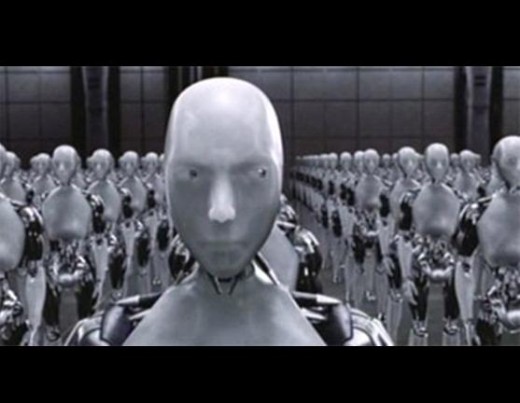See My Eyes and Know Thy Future
On the Shoulders of Geniuses
I was introduced to the concept of the singularity by my roommate. He got the idea from the book by Ray Kurzweill. I immediately bought the book (pricey). I am still in chapter one, in which he drills home the same concept from a bunch of different angles. I have never been introduced to an idea that so rapidly reshaped my imagination. And the reason it is so powerful is the fact that it's a very likely possibility and that we are currently moving that direction.
What is the Singularity?
The word "Singularity" is often associated with a critical event, like an explosion or the crossing of a threshold.
In the context Kurzweill uses the word, he is implying a point where intelligent machines become independent of human involvement. That's not exactly how he puts it, but it's a rough definition. He goes on to explain that about the same point in time humans will be able to integrate machinery with the brain and "transcend biology", essentially making a human-machine hybrid that can outperform non-hybrid humans in every aspect.
Evidence That it Comes
Kurzweill works in the computer industry and has for a long time. In his book, he has graph after graph of how information technologies have grown faster, smaller, more efficient, and cheaper over the years and done so at an exponential rate as opposed to linear.
He uses human history as a template for the future. He points out that when humans first evolved, we would advance the sophistication of our tools slowly. As humans we would double our technology about once every 250,000 years. Then once we started organizing into tribes and small disorganized civilizations it had accelerated to doubling once every 900 years. Once gunpowder and iron came around it was every couple hundred years. Then Newton, the industrial revolution, and the agricultural revolution happened and since 1800 it has doubled every 30-50 years.
If it keeps accelerating, eventually technology will double every 20 years up until the singularity. Once the singularity hits, it will accelerate to doubling once a year, then once every six months, then once a week or less. Imagine all the progress humans have made to this point, then know that will be just a tiny fraction of the progress that will be made in a single year.
This is a skimming of the evidence, if you can call it that. For more in-depth studies with actual numbers and diagrams, just check out Kurzweill's book.

What it Could Mean
There are so many possibilities, we simply just don't know. Some people would so completely integrate their bodies with machines that they almost wouldn't be human any more. Their brains would be millions if not billions of times more capable than they are currently. Disease would cease to be a problem, as would genetic deformities/ailments.
And the economy would skyrocket.
Imagine this: In the early stages of the singularity, intelligent robots were dropped on the moon with a few solar panels and a small factory. Their orders were to collect raw material and replicate. Ten robots would operate the factory, which would crank out more robots. Updates would be radioed to the moon daily. Gradually the new robots would become more sophisticated and efficient. Ten robots becomes a hundred and they build a second factory that's bigger and more efficient. Within a year of initial landing, you could have ten thousand robots. Within two years, a hundred million. Within three, a trillion robots. You could give them a single small task and have an army leaping to fulfill your command. Build me a car and it would be done in a day. Defeat me a country and it would be done in a week. Build a rocket that could carry humans to Mars or Jupiter and within a few hours humanity is on its way.
By the fifth year, a significant fraction of the moon's gravity would be comprised of these robots. And if their intelligence is exponential and each one starts off as smart as Einstein, within three years you have a trillion Einsteins out there. With that combined effort, they could accelerate their intellect until each robot was a thousand or a million times as intelligent as Einstein.
It seems like something out of a science-fiction movie. But we are rapidly approaching it or something like it.
The first country that gets there and holds the secret long enough... that country will never be overtaken in power. Ever. In fact, if America reaches the singularity and is the only country to control it for five years, we could probably take over the entire world like it was a picnic and none could challenge us. However, humanity could unite behind the singularity and nationality would become irrelevant. Anything is possible.
A God Among Insects
I don't know who says it, but previous great minds have agreed that any society that is highly advanced would appear to possess supernatural powers. Imagine if we doubled our technology once a year... Airplanes, computers, antibiotics would all cram into just a fraction of what we discover. Ten years after the singularity, would we even be able to recognize humanity?
People out there have theorized that humans are connected subconsciously, that we can communicate our will by thought. After the singularity, it won't be a subconscious thing. If we all can communicate knowledge between each other, what's to say someone won't develop software that will allow us to network our minds together? What if everyone became a superconsciousness? And if everyone joined into this superconsciousness and had ten years of rapid technological advancements, wouldn't this appear as God? Two hundred years from now, when the entire planet could be one massive supercomputer, what's to say that it won't simulate life on another planet or in a virtual reality?
Could the man people believe is God actually be a product of a different singularity? Don't worry, I'm not trying to explain the existence of a deity. I like the idea to use in stories that I write.








